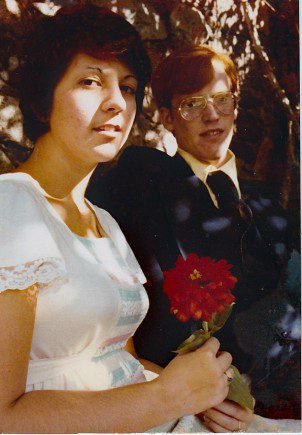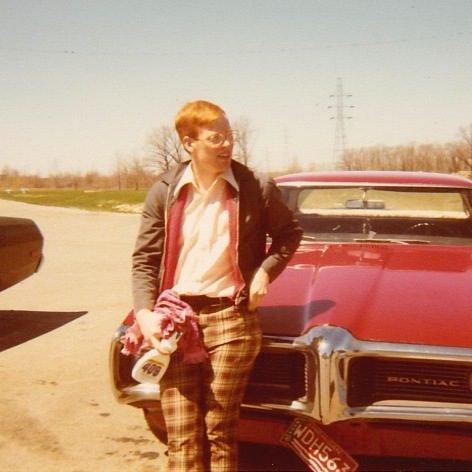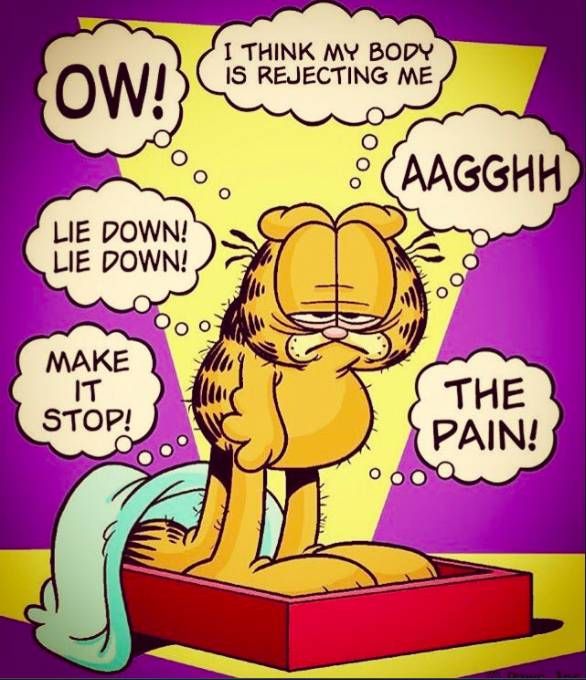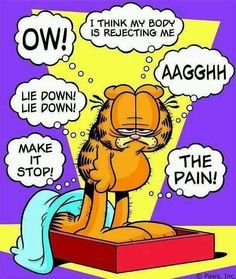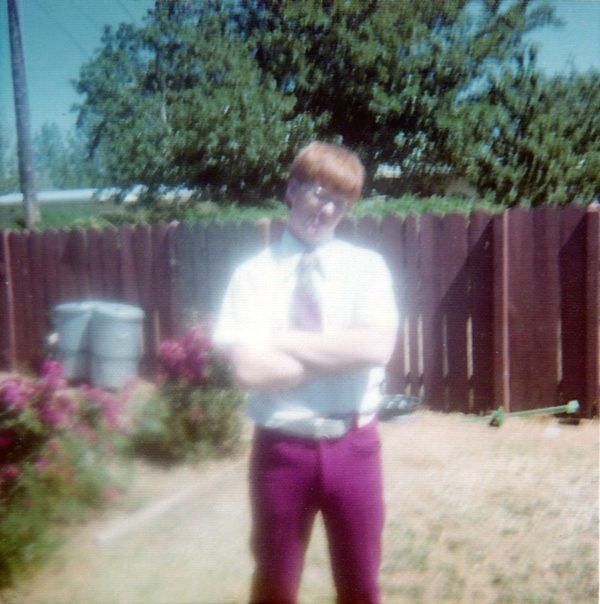
In the spring of 1972, my parents divorced. I was fourteen at the time. Several months later, both of my parents remarried. Mom married her first cousin — a recent parolee from the Texas prison system. Dad married a nineteen-year-old girl he met at the Millstream Motor Speedway outside of Findlay. She brought with her a toddler girl. A year later, Dad suddenly decided to move to Tucson, Arizona. As was his custom, he didn’t ask his children what they thought about moving. Dad treated us like furniture, things to be moved whenever he felt like it. I hated my father for uprooting us repeatedly over the years. What made this move worse was that I had actually attended the same school for thirty-one months — a record. I loved my church and had lots of friends. I played basketball and baseball and had an active social life. None of that mattered to Dad. I later learned that creditors were chasing him, and THAT was the reason for the sudden move to Arizona. Several months after we moved, Dad’s creditors finally figured out where he was and repossessed both of his cars.
I stayed in Arizona for the remainder of my tenth-grade year. As soon as school was out, I jumped on a Greyhound Bus and returned to Bryan, Ohio to live with my mom. By that time, she was living with a violent drunk named Chuck Jones. After living with Mom for two months, I moved back to Findlay to live with a church family. After a few months living with this family, I was abruptly told I could no longer live with them. At the time, I had no idea what I had done to warrant being booted out of their home. Years later, I concluded that the husband likely thought his wife and I were getting too “close” to each other. Was he right? I don’t know, but I can certainly understand him thinking that way.
I then moved in with an older woman in the church, Gladys Canterbury. I was made a ward of the court so she would receive monthly income for my care, and I would have Medicaid health insurance. I finished my eleventh-grade year in May 1974, and then, unbeknownst to Gladys, I arranged for my mom to pick me up so I could move back home. This caused quite a bit of controversy, including threats of arrest. I was, after all, a minor and a ward of the court. However, I was also seventeen, close to the age of emancipation, so the court decided not to intervene.
When it came time to enroll at Bryan High School for my senior year, I decided I no longer wanted to go to high school. Mom was livid when I told her I was dropping out of school. I was a good student, but I just wanted to do my own thing at this point in my life. Influencing this decision was the fact that one of my friends had also dropped out of school. In the 2000s, I took and passed the GED exam, remedying one of the biggest mistakes of my life.
In November of 1974, Mom was committed to the state psychiatric hospital in Toledo, leaving her children, ages 17, 16, and 14 to fend for themselves. Dad got wind of this and came to Bryan to move us back to Arizona. By this time, Dad had moved to Sierra Vista.
Got all that? Now let me get to the subject of this story: Anita.
Once settled in Sierra Vista, I quickly found union employment as a stocker and cashier at Food Giant. As a devout Independent Fundamentalist Baptist (IFB) Christian, I also found a new church to attend, Sierra Vista Baptist Church — affiliated with the Conservative Baptist Association of America. It was while attending this church that I met a nineteen-year-old girl named Anita Farr.
Anita and I quickly hit it off, and for the next five months, we had a torrid relationship — Baptist-style. No sex, but lots of making out. While I had dated lots of girls before Anita, she was what I would call my “first love.” Whether she truly “loved” me, I still don’t know, but we were inseparable until she left for college in the fall of 1975.
Anita and I had similar personalities: talkative, bullheaded, and ornery. Years later, I concluded that had we gotten married, one of us would have killed the other and ended up in prison. Our similar personalities quickly put us on the radar of the legalists in our church. One deacon, Chuck Cofty, took issue with Anita’s miniskirts, asking me to do something about it. I, of course, didn’t have a problem with Anita’s skirts. Some members also had a problem with Anita waitressing at a local pizza place that served beer — a cardinal sin in IFB churches. While Anita could have got a job elsewhere, I suspect she loved the fact that her employment irritated the hell out of the church’s legalists.
Our first date was at the Reid Park Zoo in Tucson. We also took several trips to Mexico, spending the day walking the streets of the border towns. As I look back on our time together, we spent a lot of time driving — anywhere that was away from Sierra Vista. We would drive for hours with no planned destination, talking about God, family, and one another. Sometimes, we would take drives up into the mountains and park to watch the stars — well, that, and make-out. Both of us also loved to hike. Our hikes took us all over southeast Arizona, including to the hummingbird sanctuary in Ramsey Canyon.
Anita, on occasion, would come to my house. My siblings are fond of reminding me that I gave them money to go to 7-11 while Anita was there. I remember my dad “meeting” Anita for the first time. We were lying on the floor making out when Dad walked in on us. “Hi, this is my girlfriend, Anita.” I also spent a fair bit of time at Anita’s house. One night, we were sitting at the dinner table, and Anita said something smart to her father. Her dad stood up and smacked her, knocking her off her chair. I was shocked by her father’s behavior. I was fourteen the last time my dad laid a hand on me.
In the fall of 1975, Anita moved to Phoenix, Arizona to begin her sophomore year at Southwestern Conservative Baptist Bible College — now known as Arizona Christian University. We intended to continue our relationship. I would drive up to Phoenix on weekends to visit Anita, staying in the college’s dormitory. However, I began to notice a different Anita. I saw that she was quite the flirt, and this, of course, made me jealous. This came to a head in late September. Filled with jealousy and pettiness, I broke off our relationship. I jumped in my 1967 Chevy wagon and returned to Sierra Vista at breakneck speeds, picking up a speeding ticket several miles from home. A week later, I packed up my meager belongings, hopped a bus, and returned to Bryan, Ohio.
Our break-up emotionally wounded me, affecting my dating proclivities and relationships with women for quite a while. While I dated several women post-Anita, I made it clear that I was not interested in a serious relationship. I would carry this feeling with me to college, thinking that I would spend my years at Midwestern Baptist College being a serial dater. However, I met a beautiful dark-haired girl named Polly, and forty-two years later, I am still madly in love with her.
Anita and I corresponded several times after I returned to Ohio. I lost touch with her, and I have often wondered how life turned out for the first love of my life.
Bruce Gerencser, 68, lives in rural Northwest Ohio with his wife of 47 years. He and his wife have six grown children and sixteen grandchildren. Bruce pastored Evangelical churches for twenty-five years in Ohio, Texas, and Michigan. Bruce left the ministry in 2005, and in 2008 he left Christianity. Bruce is now a humanist and an atheist.
Your comments are welcome and appreciated. All first-time comments are moderated. Please read the commenting rules before commenting.
You can email Bruce via the Contact Form.

